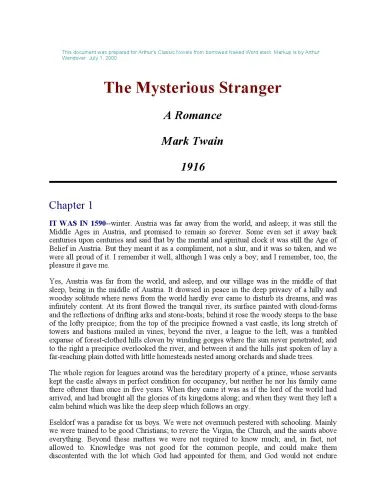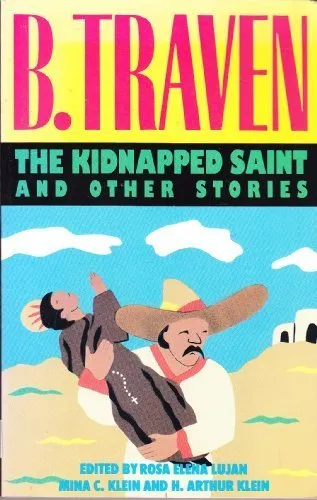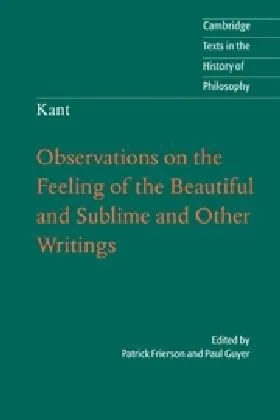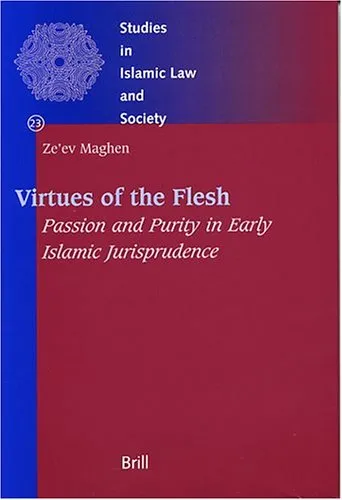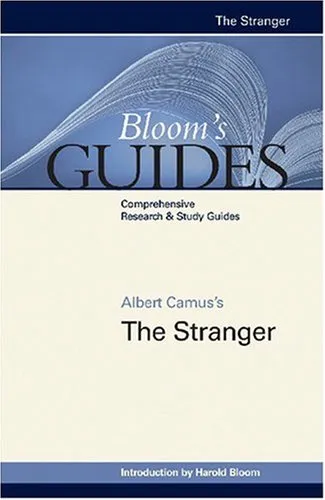The Mysterious Stranger (Twain, Mark Mark Twain Library)
4.3
Reviews from our users

You Can Ask your questions from this book's AI after Login
Each download or ask from book AI costs 2 points. To earn more free points, please visit the Points Guide Page and complete some valuable actions.Related Refrences:
The Mysterious Stranger: An Introduction
"The Mysterious Stranger," a captivating narrative by Mark Twain, represents one of his boldest explorations into human nature, morality, and the metaphysical. Twain, primarily known for his adventurous and humorous storytelling, here embarks on a darker and more philosophical journey, providing readers with profound insights into the human condition through a speculative tale filled with mysterious and supernatural elements. Though the book was published posthumously and constructed from Twain's various unfinished manuscripts, it remains a powerful and thought-provoking piece that is rich in thematic depth and moral inquiry.
Detailed Summary of the Book
"The Mysterious Stranger" is set in a remote Austrian village, Eseldorf, at the end of the 16th century. The story unfolds through the eyes of a young boy named Theodor Fischer. Theodore and his friends encounter a mysterious stranger named Satan, who introduces himself as the nephew of the Biblical Satan. This Satan possesses extraordinary abilities, ranging from invisibility to performing miraculous feats, unsettling the quaint, pious town.
As the narrative progresses, this enigmatic figure guides the boys into a series of thought-provoking scenarios, challenging the moral and societal conventions of their seemingly simple lives. Through Satan's interventions, Twain raises profound questions about free will, moral responsibility, and the essence of humanity, juxtaposed against the backdrop of a conservative and superstitious society.
The story crescendos with Satan revealing the illusory nature of reality, culminating in a chilling declaration that human existence is but a dream—an ephemeral, fragile passage in an indifferent universe. Twain's tale artfully combines elements of allegory, dark satire, and existential questioning, leaving an indelible impact on readers as they grapple with the complex implications of the narrative.
Key Takeaways
- The exploration of the nature of reality and free will plays a central role, prompting readers to reflect on the constraints that society and belief systems place on personal freedom.
- Twain's critique of organized religion and societal norms challenges the conventional wisdom and the blind following of authority, encouraging a more critical and inquisitive approach to life.
- The book explores existential themes, suggesting the insubstantial and illusory nature of life, a perspective that resonates with many existential philosophers.
- The duality of human nature is a recurring theme, as Twain delves into the inherent contradictions and moral ambiguities present in humanity.
Famous Quotes from the Book
"Nothing exists; all is a dream. God — man — the world — the sun, the moon, the wilderness of stars — a dream, all a dream; they have no existence. Nothing exists save empty space — and you! And you are not you — you have no body, no blood, no bones, you are but a thought. I myself have no existence; I am but a dream — your dream, a creature of your imagination."
"There is no God, no universe, no human race, no earthly life, no heaven, no hell. It is all a dream — a grotesque and foolish dream. Nothing exists but you. And you are but a thought — a vagrant thought, a useless thought, a homeless thought, wandering forlorn among the empty eternities!"
Why This Book Matters
"The Mysterious Stranger" holds significant value not only as a literary masterpiece but also as a critical social commentary. Twain's incisive prose allows readers to question societal norms and engage with philosophical issues that are as pertinent today as they were in Twain's time. The book serves as a powerful reminder of the complexity of human nature, while also encouraging readers to reflect on the deeper mysteries of existence and consciousness. Its speculative narrative and bold assertions make it a cornerstone in the realm of thought-provoking literature.
Despite the unfinished nature of the work, Twain's "The Mysterious Stranger" is celebrated for its imaginative storytelling and profound depth, solidifying its place in the canon of existential literature. For readers seeking an engaging narrative that challenges perceptions and stimulates philosophical inquiry, this book is an essential read.
Free Direct Download
You Can Download this book after Login
Accessing books through legal platforms and public libraries not only supports the rights of authors and publishers but also contributes to the sustainability of reading culture. Before downloading, please take a moment to consider these options.
Find this book on other platforms:
WorldCat helps you find books in libraries worldwide.
See ratings, reviews, and discussions on Goodreads.
Find and buy rare or used books on AbeBooks.
1464
بازدید4.3
امتیاز0
نظر98%
رضایتReviews:
4.3
Based on 0 users review
Questions & Answers
Ask questions about this book or help others by answering
No questions yet. Be the first to ask!
